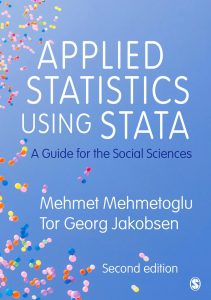Please note: This course will be taught online only. In person study is not available for this course.

Tor Georg Jakobsen is a Professor in Political Science at the NTNU Business School. He is co-author (with Mehmet Mehmetoglu) of Applied Statistics using Stata: A Guide for the Social Sciences (Sage 2016) and has authored and co-authored numerous articles in, among others, European Sociological Review, Work, Employment & Society, Regional Studies, and Conflict Management & Peace Science. His research interest includes political behavior, sports economics, and statistical methods. Jakobsen is also winner of the 2020 Bernard Brodie Prize (together with Jo Jakobsen). He has taught quantitative courses at all levels.
Course Content
This course covers regression analysis, both with continuous, ordinal, and categorical dependent variables. The focus will be on applied regression analysis, yet we will also deal with related topic like data treatment in Stata, interpretations, and how to test regression assumptions. The course includes ordinary least squares regression, logistic, ordinal, and multinomial regression, how to model and interpret non-linear effects as well as different types of statistical interactions. We will also focus on how to deal with breaches of assumptions.
Course Objectives
The course will enable the students to perform a range of regression models, to work with data treatment, and to be able to critically evaluate and interpret different types of regression models.
Course Prerequisites
The students should have some knowledge about basic descriptive statistics, measures of central tendency and spread. It is also good to have some knowledge about the statistical software Stata. However, instruction and notes will be made available, so it is possible for everyone to follow (though you must work harder if you do not have previous knowledge). The course will, to a large degree, follow the structure of the book Applied Statistics using Stata. In the reading list are also included short Sage books from the series Quantitative Application in the Social Sciences that dwell deeper into the topics of logistic regression and missing data (note that these are not Stata-books but deals more with statistical theory). In the recommended readings section, I have included to Stata introduction books for those who are not very comfortable with this software (you only need one of these), as well as a book on dummy variables and some additional chapters in our main book.
Course material
The students will have access to lectures, computer lab assignments, and datasets. The former two are also available as video-recordings (links to the lectures and computer instructions will be provided). There will be one topic each day, with a combination of online teaching with a following computer lab for each lecture (both will be through Zoom).
Be aware that even though the course is divided into 10 topics, some topics require more work than others (especially topic #3).
Required Texts

Mehmetoglu, Mehmet & Tor G. Jakobsen (2022). Applied Statistics using Stata: A Guide for the Social Sciences, 2nd ed. Thousand Oaks, CA: Sage. Chapters: 1, 2, 3, 4, 5, 6, 7, 8 & 15. – (this text will be provided by ESS)
Recommended Readings
Acock, Alan C. (2018). A Gentle Introduction to Stata, 6th ed. College Station, TX: Stata Press.
Hardy, Melissa A. (1993). Regression with Dummy Variables. Thousand Oaks, CA: Sage.
Part 1: Introduction to Stata, Research and Statistics
- Research and statistics
- Introduction to Stata
Part 2: Regression analysis
- Bivariate regression
- Multiple regression
- Dummy-variable regression
- Interaction effects
- Assumptions and diagnostics
- Logistic regression
Part 3: Advanced topics
- Critical issues
- Advanced topics
Background knowledge required
It is an introduction course, so a little background in e.g. Stata is an advantage, but not necessary (as the candidates will learn it during the course)
POTENTIAL ESS APPLICANTS ARE TO BE ADVISED THAT RECORDINGS WILL NOT BE MADE AVAILABLE FOR THIS COURSE.


